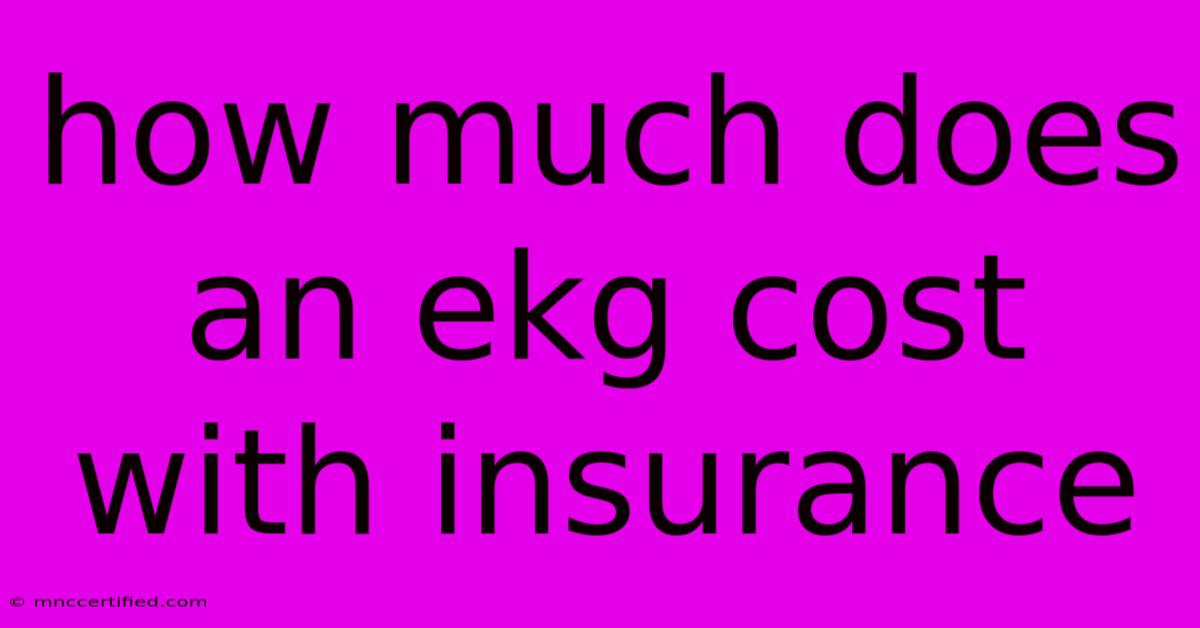How Much Does An Ekg Cost With Insurance

Table of Contents
How Much Does an EKG Cost With Insurance?
An electrocardiogram (EKG or ECG) is a common, painless test that measures the electrical activity of your heart. It's used to diagnose a range of heart conditions, from arrhythmias to heart attacks. While the cost of an EKG can vary, understanding how insurance affects the price can help you budget for your healthcare needs.
Understanding EKG Costs
The cost of an EKG can vary depending on several factors, including:
- Location: EKG costs can differ depending on the geographical location of the clinic or hospital.
- Provider: The specific medical provider performing the EKG can also influence pricing.
- Facility Type: Whether the EKG is performed in a hospital, clinic, or doctor's office can impact the cost.
- Complexity of the Test: Some EKGs might involve additional analysis or interpretation, which can add to the cost.
How Insurance Affects the Price
Your health insurance plan can significantly affect the out-of-pocket cost of an EKG. Here's a breakdown:
- Co-pay: Many insurance plans have a co-pay for diagnostic tests, which you'll pay at the time of service.
- Co-insurance: Some plans have a co-insurance percentage, meaning you pay a certain percentage of the total cost.
- Deductible: You may have to meet your annual deductible before your insurance kicks in, meaning you'll pay the full cost of the EKG until you reach that threshold.
Important Note: Your insurance plan might require pre-authorization for the EKG, so be sure to check with your insurer before scheduling the test.
Cost Examples
While it's impossible to give an exact cost, here are some general examples to illustrate the impact of insurance:
- Without insurance: The average cost of an EKG without insurance can range from $50 to $150.
- With insurance: Your out-of-pocket cost with insurance could be as low as $10 or $20 for a co-pay, depending on your plan.
Tips for Reducing Costs
- Shop around: Call different clinics or hospitals to compare prices.
- Use an in-network provider: Most insurance plans have lower costs for services performed by in-network providers.
- Ask about payment options: Some clinics offer payment plans or discounts for cash payments.
Conclusion
Understanding the factors that influence EKG costs and how your insurance plan covers them can help you plan your healthcare budget effectively. By being informed and proactive, you can ensure that you receive the necessary medical care without excessive financial burden.

Thank you for visiting our website wich cover about How Much Does An Ekg Cost With Insurance. We hope the information provided has been useful to you. Feel free to contact us if you have any questions or need further assistance. See you next time and dont miss to bookmark.
Featured Posts
-
Disability Insurance Lawyer North Carolina
Nov 07, 2024
-
Polygon B Is A Scaled Copy Of Polygon A
Nov 07, 2024
-
Jack Smith Winds Down Federal Cases
Nov 07, 2024
-
Barcelona Vs Crvena Zvezda Predicted Starting Xi
Nov 07, 2024
-
Trumps Party Wins Senate What Now
Nov 07, 2024